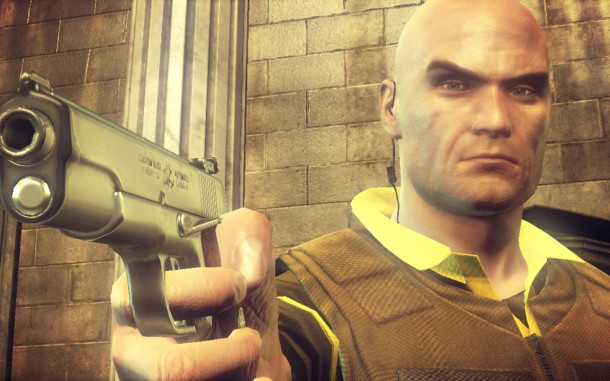Our Verdict
A passable stealth game, but one that betrays almost everything that, until now, has made Hitman great.
PC Gamer's got your back
To give you an idea, on a 2.8 GHz quad core with a Radeon HD 4800, it now runs at about 30-40 FPS on medium settings. It used to be 15 even on minimum.
The previously awful performance contributed to it feeling like a shonky PC port to me, and I took it into account in the score. Now that it runs decently, the game feels approximately 4% less shonky, and I've adjusted the score accordingly. This is about as scientific as the initial scoring process.
If you're ever sad about how many games these days are sequels, go back and play Hitman: Blood Money again. The assassin-sim series struggled for three games to understand its own strengths, and Blood Money found them all.
Almost every mission was an absurdly rich playground of deadly possibilities. You were usually free to roam them undisguised, watching patrol routes, tracking targets, studying the environment, and planning the perfect murder. The plot was sidelined in order to avoid interfering with the business of killing, the levels were large, and your tools were versatile and intricately customisable. The fans adored it, and it's one of my favourite games of all time.
Hitman: Absolution goes... in a different direction.
'Disaster' is a strong word, which is good because we need one. Absolution is a disaster. It's almost the polar opposite of Blood Money: instead of sidelining the story to focus on big, open-ended assassination missions, it sidelines assassination to focus on telling a long, linear, and embarrassingly bad story. In game terms, that means most of its levels task you with reaching and opening a particular door. If it was called Doorman: Absolution, it would be much less disappointing.
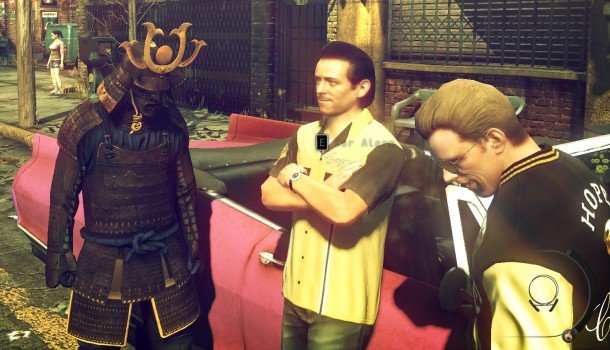
That's not even its biggest problem. Its biggest problem is that it doesn't have a save function, so every screw-up or glitch of game logic costs you a galling amount of pointless repetition. Very rarely there are mid-mission checkpoints, but even if you can find them, they don't save vital aspects of your progress. Guards that you've killed respawn. Bodies vanish. Disguises and items you've left disappear. It's suspiciously as if the developers just never figured out how to store all the relevant information.
The reason this hurts the game so deeply is that two of Hitman's core appeals are experimentation and perfectionism. It's still a game with a lot of items and systems to play around with, but doing so is madness when 15 minutes of perfectly stealthy progress are at stake. And when your ghost-like performance is blown at the last minute by the unpredictable rules of the guard's detection logic, it's hard to muster the will to repeat the whole level in the hope that it won't happen again. Particularly when the stealthy approach involves waiting for achingly long conversations to finish before guards go their separate ways.
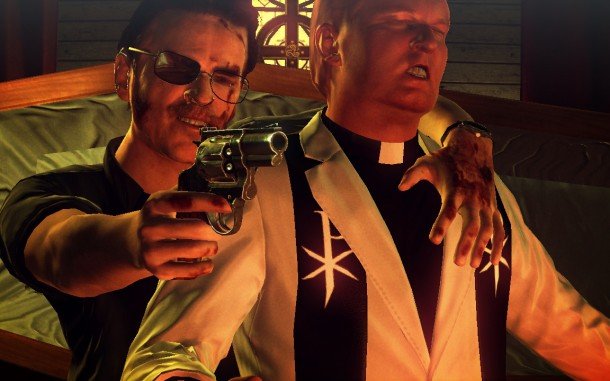
When I first started playing, three different tutorial tips advised me to press the left mouse button 'gently' to aim more accurately, or chided me for 'squeezing' it too hard. Those have been corrected in a patch, but aiming is still a needlessly clumsy emulation of a console controller's analogue input: you have to hold two different aim buttons to be accurate.
It also appears to have been rendered through a Vaseline lens, causing anything as bright as a flesh tone to burn with the bloom of a thousand suns. When it catches the light, your bald head glints so dazzlingly that beams of pink lens flare erupt from it in four directions.
It's a shame, because beneath that some of the locations are beautiful. They're just a bit small. Each mission is split into a series of short levels, connected by a single door that you can't go back through. And you can't open these doors if any guards on the level are alert. When the objective of some levels is to escape captivity or attackers, being locked in until your opponents stop looking for you starts to feel a little perverse.
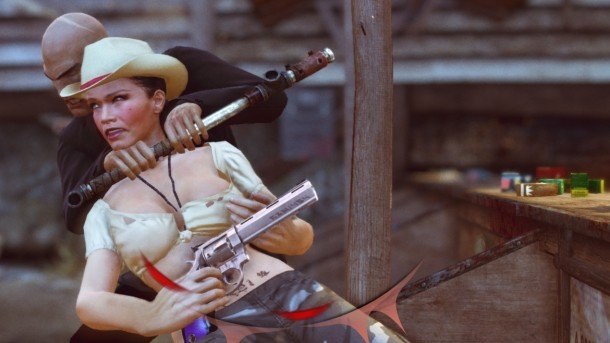
Three-quarters of these levels are purely about traversal: you're just trying to get from A to B to move the story forwards, and if you're given anyone to kill at all, it happens in a cutscene or scripted slow-mo event. The other quarter do give you a target to kill, and a choice of how to do so, but that segmentation means you're operating in a space that isn't as rich or complex as a typical Hitman: Blood Money mission.
The other thing that really hurts Absolution's few actual assassinations is the new equipment system. There isn't one. You give away all of your trademark kit at the start of the game, and start most missions with one bad, loud pistol. You never get to buy or choose your weapons in the campaign, so you're stuck with whatever you find lying around. The ones you pick up will carry over to the next segment of the mission, but are lost again when you complete it.
Can you snipe this target from afar? Depends if the level designer left a sniper rifle somewhere. If they did, they probably put it in the ideal sniping spot to save you the mental effort of choosing one for yourself. Can you set explosives and detonate them when your target walks by? Depends if the level designer left any inexplicably strewn around, and if you find their illogical location. Even then, you can no longer throw them, put them inside containers, or stick them to surfaces.
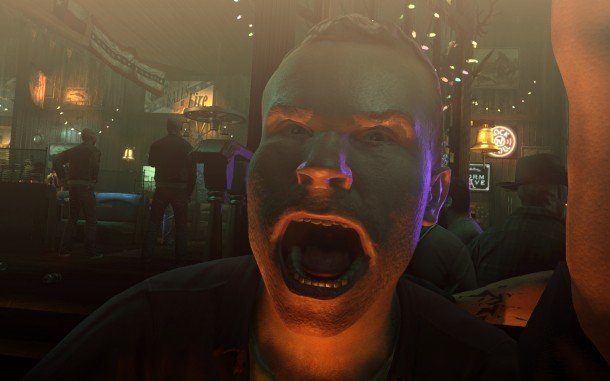
So much that used to be universal, versatile systems is now left to the level designer's whim. Hitman's greatest pleasure was coming up with your own solutions, but even at its best, Absolution makes it feel like you're choosing between the ones the designers provided for you.
Its most promising addition is a new way of handling disguises. As in real life, you can dress up in the clothes of almost anyone you kill or subdue. And as in previous Hitman games, wearing the right clothes makes it easier to walk into restricted areas undetected. The twist this time is that people wearing the same clothes you've dressed up in will find you suspicious, whereas everyone else will leave you alone.
It makes sense – cops might be suspicious of a cop they don't recognise, but not a janitor. And it could be the basis for an extra layer of strategy: dress as a janitor to get past the police, then take out a cop and put on his uniform to get in everywhere else. But it's undermined by two things.
The first is, yet again, the level design. You spend the vast, vast majority of every mission trying to get past the same type of guard, and they almost never permit a disguise other than their own. Gangsters shooting up an orphanage full of nuns – an actual thing that happens in this videogame – will open fire on anyone but their gangmates. Cops at a crime scene are similarly strict. So you spend almost all of your time dressed as the people you're avoiding.
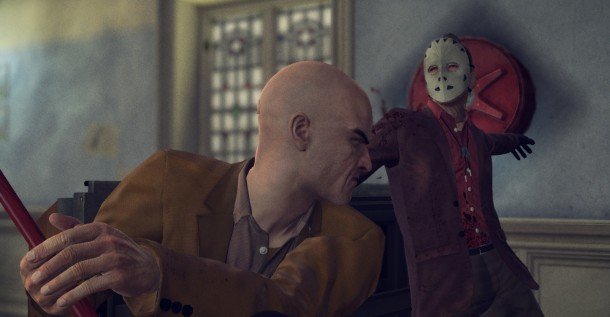
That leads you into the other problem: suspicion is viciously over-reactive, and to all the wrong things. Guards rumble you in a split second if you stray close to them, and in pretty short order even at extremely long range. That changes it from a disguise game to a stealth game: your only challenge is to break line of sight, so you stick to sneak mode, hug cover, and do commando rolls between anything that blocks their vision. This – unlike walking normally – they have absolutely no problem with.
On lower difficulties, you can hold down a key to allay their suspicions by putting your hand over your face. I can't think of a way to mock this that would make it sound any more absurd than that, so I won't try. It's a crutch to mitigate the stifling effect of a bad mechanic. And the fact that it's useful is actually a bad thing: it uses a resource called Instinct, which you can recharge by killing guards. So there's now a material reward for the gratuitous murder the series has always tried to gently discourage.
Both suspicion and regular stealth glitch out regularly: I've been spotted through two solid walls on several occasions, and at other times supposedly silent actions brought guards running. Irritating in any game, disastrous in one with no save function.
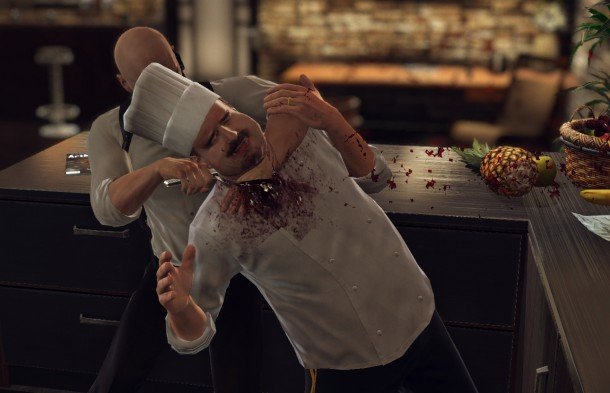
With or without Instinct, the new disguise system removes the single best thing Blood Money brought to the series: the ability to walk freely around almost every level, planning your approach without having to conceal your presence. It reduces Absolution to a more ordinary stealth game – and for me, Hitman was always better than that.
I keep coming back to the failings of the level design, and most of them stem from its determination to tell a story. It's a tedious farce of pantomime villains, voiced by Hollywood actors utterly wasted on this adolescent, exploitative trash. And I'm fine with that. Every Hitman game has had a terrible story, but until now it has rarely mattered.
The problem with Absolution is that they actually decided to focus on it this time. In an attempt to paint you as some kind of misunderstood hero, Absolution has you quitting your job to protect a teenage girl. This story frequently requires you to get from A to B, but rarely involves a legitimate reason for you to kill. And when it does, you don't always get to do it.
Several of the actual kills happen in cutscenes, and sometimes all your hard stealth work in getting to the target is rewarded with a cinematic of your character screwing it up. It's kind of mindboggling to imagine how anyone could stray so far from the point of a series whose entire concept is right there in the title.

I guess the new Contracts mode is meant to be the antidote to this, and it is a nice idea. You can load up any level from the main game, choose your weapons (at last!) and mark up to three people as targets. The way you choose to kill them, and how stealthily you do so, become the objectives of a contract. Other players can then take on your contract and try to kill the same people, with the same weapons, just as stealthily. They get a score for all those things, and a bonus if they do it faster than you.
Creating these contracts is a little aimless: civilians and guards are pretty much interchangeable, so I don't have any burning desire to pick out three particular targets who need to die. But playing other people's contracts is fun: some are very straightforward, but already people are adding entertaining twists. The last one I played insisted that I run into a town dressed in full samurai armour and kill a particular cop with a sledgehammer. Players will probably come up with sillier contract concepts once the game is out.
It's no substitute for the kind of freedom Hitman used to give you, though. When creating a contract, you have too much – it doesn't matter who you kill, so who cares? And when playing one, you have too little: the contract specifies what to wear and which weapon to use, so you're basically just following orders.
And guess what? DRM! Despite the fact that the contracts themselves must be tiny amounts of data, you can't play any of them – even your own – offline. You have to be connected and logged in, and if their servers are down, you're shut out. They've really done an impressive job of racking up all the different ways you can irritate PC gamers.
These are all the reasons I found Absolution crushingly disappointing. These are the reasons it's a terrible Hitman game, and it's worth saying that in the strongest possible terms, because Hitman is an important and brilliant series of games. But despite all of that, it isn't a terrible game, and it doesn't deserve a terrible score.
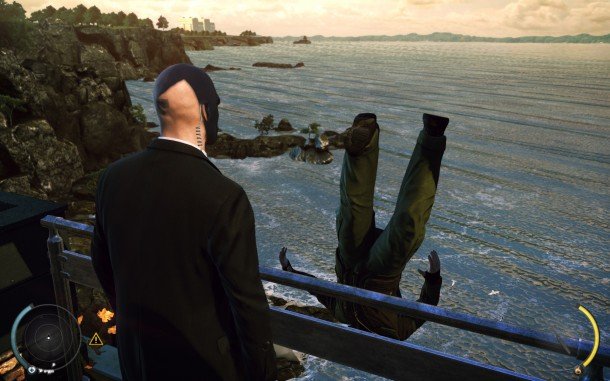
Called something else (I'm still rooting for Doorman: Absolution), it'd be a decent sneak-em-up with some welcome Hitman influences. Creeping past people is inherently fun, even if you're gaming some weird suspicion mechanic while you do it. So is knife-throwing. I will never be able to forgive the shitty checkpointing, but it's certainly less of a problem once you get good. And on the rare occasion that you find a disguise that lets you roam freely, some of the levels have lots of different routes to try.
There's one mission, right near the end, that's genuinely very good. There's one target, a decent sized area, a particular disguise that lets you roam anywhere, and three different ways to make the death look accidental. It's still smaller and less interesting than any of Blood Money's main missions, but it's one I actually wanted to replay. Any game that can capture part of that thrill is worth playing.
Currently, though, Absolution is not worth buying. If they can somehow patch in a save function, and if players do interesting things with Contracts, it will be. Until then, I'd wait for a preposterous Steam sale.
That's something I never thought I'd have to say about a Hitman game. I desperately hope the reaction to it is strong enough to convince the developers to change direction, because I couldn't stand to watch the series die like this.
A passable stealth game, but one that betrays almost everything that, until now, has made Hitman great.
